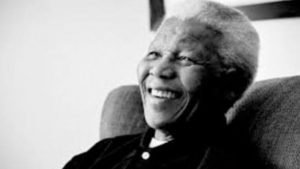 Had he lived, South African President Nelson Mandela would have marked his 100th birthday today which is most appropriately being observed as Nelson Mandela International Day.
Had he lived, South African President Nelson Mandela would have marked his 100th birthday today which is most appropriately being observed as Nelson Mandela International Day.
The United Nations has declared that this centenary is an occasion to reflect on Mr Mandela’s life and legacy, and to follow his call to “make of the world a better place”.
The Nelson Mandela Foundation, we are told, is dedicating this year’s Mandela Day to action against poverty, honouring his leadership and devotion to fighting poverty and promoting social justice for all.
That, we believe, is a fitting way to honour the legacy of a man whose resolve to stand up against injustice and racial prejudice still continues to inspire people across the world who uphold the noble ideals of freedom and dignity.
We recall with great pain his passing at the age of 95 on December 5, 2013. At the same time, we give thanks for his life because, as we have argued before, President Mandela — through his exemplary contribution to the development of his beloved country, and indeed the world in general — repeatedly gave us reason to reflect on our purpose here.
The world must never forget Mr Mandela’s address to the court during his unjustified trial for treason in April 1964 when the abominable Apartheid Government in South Africa sought to put him to death.
“I have fought against white domination, and I have fought against black domination,” he said. “I have cherished the ideal of a democratic and free society in which all persons live together in harmony and with equal opportunities. It is an ideal which I hope to live for and to achieve. But, if needs be, it is an ideal for which I am prepared to die.”
That statement, we hold, more than any other, defined Mr Mandela as a strong advocate of freedom, human rights, equality, and justice. It also served as a rallying cry against tyranny and oppression.
The true mettle of this great man was displayed after he was elected president of South Africa in 1994 as he turned his face firmly against exacting vengeance on white South Africans for the decades of wrong that they committed against the majority black population. By doing so he made it abundantly clear that he held a fundamental belief in upholding the principles that framed his belief in humanity.
That the Nobel Committee awarded him, along with then South African President F W de Klerk, the Peace Prize in 1993 was not surprising, and he justified that award further when, on accepting it, he displayed great humility, saying: “The award was a tribute to all South Africans, and especially to those who fought in the struggle; I would accept it on their behalf.”
Today, as we honour the memory of this great man, it is incumbent on each one of us to examine our actions — how we deal with our fellow human beings; how we conduct ourselves in private and in public; and how we can contribute to making the world a better place, not only for us but for generations to come.
Let us use President Mandela’s life as a source of inspiration, and when challenges present themselves, as they will, let us gather strength from the wise instructions of this man, who told us: “It is easy to break down and destroy. The heroes are those who make peace and build.”
